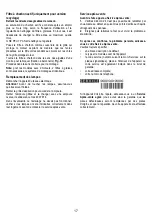
12
edge of template
N2
(*)
. Fig. 7-8
c.
Make the holes as indicated. Fix 2 hooks (*)
R
to the wall
with screws and dowels.
Fig. 7
d.
In case the thickness of the lateral wall units is 16mm,
put, with embedded fixing, the
O
(*) spacers at the sides
of the hood in correspondence with the holes used for the
passage of the fixing screws to the lateral wall units.
Fig.
8
.
e.
Hang the hood onto the hooks (*) and adjust the position
of the hood with headless screws
S1
and adjusting the
position of the hooking brackets with screws
S2
.
Fig. 7
f.
Fix the hood to the lateral wall units with 4 screws
P
.
Fig.
8
g.
Mount the lower corner
Q
(*) to the hood with two screws
and plastic washers
T
. They will serve to cover possible
spaces between the rear of the hood and the wall.
Fig. 7
Operation
Use the high suction speed in cases of concentrated kitchen
vapours. It is recommended that the cooker hood suction is
switched on for 5 minutes prior to cooking and to leave in
operation during cooking and for another 15 minutes
approximately after terminating cooking.
Use the keys or buttons envisaged for the control of the lights
and the power of the available suction.
Only in some models:
switching on and off the fan that
adjusts the suction power and, in some cases, switching the
lights on and off, is controlled by opening and closing the
steam collector.
Maintenance
WARNING:
-
Use safety gloves.
-
Disconnect the appliance from the power supply.
Or if the appliance has been connected through a plug and
socket, then the plug must be removed from the socket.
Cleaning
WARNING:
-
Never use steam cleaning equipment.
-
Disconnect the appliance from the power supply.
The cooker hood should be cleaned regularly (at least with the
same frequency with which you carry out maintenance of the
fat filters) internally and externally. Clean using the cloth
dampened with neutral liquid detergent. Do not use abrasive
products.
DO NOT USE ALCOHOL!
WARNING:
Failure to carry out the basic cleaning
recommendations of the cooker hood and replacement of the
filters may cause fire risks.
Therefore, we recommend oserving these instructions.
The manufacturer declines all responsibility for any damage to
the motor or any fire damage linked to inappropriate
maintenance or failure to observe the above safety
recommendations.
Grease filter
Traps cooking grease particles.
If situated inside the support grill, it may be one of the
following types:
Paper filter
must be replaced once a month or if colouring
appears on upper side, in such cases the colouring is evident
through the grill openings.
Sponge filter
should be washed with hot soapy water once a
month and replaced every 5 to 6 washes.
Metallic filter
must be cleaned once a month, with non
abrasive detergents, by hand or in dishwasher on low
temperature and short cycle.
When washed in a dishwasher, the grease filter may discolour
slightly, but this does not affect its filtering capacity.
To access fats filter V
,
open the suction grill with hooks
H1
or
H2
(depending on the model in possession) and free it from
the W stops.
Fig. 9
Some models are provided with anti-grease filter incorporated
in the suction grill, these should be removed from the housing
by pulling the handles
H2 (Fig. 9)
upwards and sliding out,
wash these filters as with metallic filters.
Charcoal filter (filter version only)
It absorbs unpleasant odours caused by cooking.
The saturation of the activated charcoal occurs after more or
less prolonged use, depending on the type of cooking and the
regularity of cleaning of the grease filter.
In any case it is necessary to replace the cartridge at least
every four mounths.
The carbon filter may NOT be washed or regenerated.
Cover the grill that protects the suction motor with the carbon
filter so that the slots on the filter correspond to the pins on the
sides of the motor protection grill.
Turn the carbon filter clockwise to block them (bayonet fixing).
Fig. 10
Proceed in reverse for mounting.
Note:
2 filters are needed in the models with 2 motors. The
system of montage and dismantling is identical.
Replacing lamps
Disconnect the hood from the electricity.
Warning!
Prior to touching the light bulbs ensure they are
cooled down.
Remove the suction gril to access the lamp area.
Remove the damaged lightbulb and replace with an oval
incandescent lightbulb max. 40W E14.
If the lights do not work, make sure that the lamps are fitted
properly into their housings before you call for technical
assistance.






































